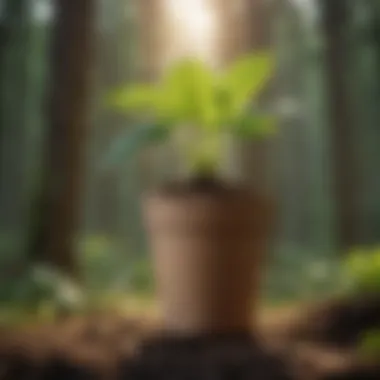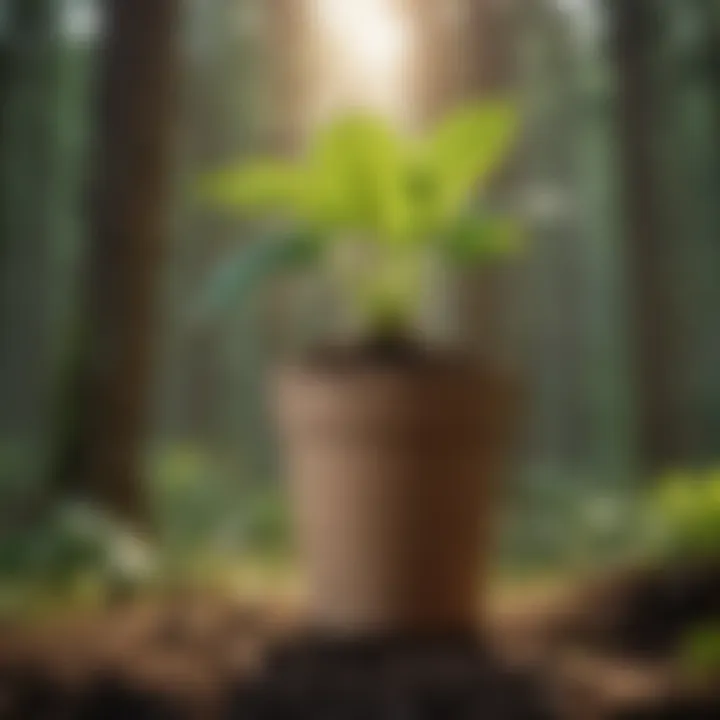Unveiling the Eco-Friendly Marvel: Biodegradable Paper Pots Reshaping Gardening Practices


Evergreen Trees Species
Biodegradable paper pots stand at the forefront of sustainable gardening practices, but the journey of environmental consciousness extends beyond plant care. Dive into the realm of evergreen trees, pillars of resilience and longevity within American forests. Discover a myriad of evergreen tree species gracing the landscapes, from towering pines to majestic firs. These trees encompass a rich tapestry of ecological diversity, each species a testament to nature's intricate design.
Delve into the ecological significance of evergreen trees, understanding their vital role in maintaining ecosystem balance and supporting wildlife habitats. Beneath their verdant canopies, a complex web of life flourishes. Explore how these steadfast trees serve as cornerstones of sustainability, providing oxygen, shelter, and nourishment to a plethora of flora and fauna.
Unveiling conservation practices is paramount to safeguarding these ancient sentinels. From sustainable logging techniques that ensure responsible timber harvesting to dedicated wildlife habitat preservation strategies, the efforts to protect evergreen tree species are multifaceted and vital. By embracing conservation initiatives, we fortify our commitment to preserving these invaluable natural treasures for generations to come.
Introduction to Biodegradable Paper Pots
Biodegradable paper pots represent a significant advancement in sustainable gardening practices, embodying the essence of eco-consciousness and environmental responsibility. In this article, we embark on a compelling journey delving into the realm of biodegradable paper pots, shedding light on their pivotal role in revolutionizing traditional horticultural methodologies. By exploring the manufacturing process, benefits, and environmental implications of these innovative alternatives, we aim to provide a comprehensive overview that underscores their relevance in modern gardening practices.
Understanding the Concept of Biodegradability
Understanding the concept of biodegradability is paramount when delving into the realm of biodegradable paper pots. These pots are designed to decompose naturally over time, reducing waste accumulation and promoting a circular economy. By grasping the scientific principles behind biodegradation and its implications for horticulture, we can appreciate the significance of opting for eco-friendly alternatives in gardening practices.
Evolution of Sustainable Gardening Practices
The evolution of sustainable gardening practices has been closely intertwined with the emergence of biodegradable solutions such as paper pots. As gardening enthusiasts and environmental advocates alike seek ways to minimize their ecological footprint, the adoption of biodegradable materials has gained traction. This section explores the historical context and the transformative journey that has led to the widespread acceptance of sustainable solutions in modern horticulture.
Significance of Eco-Friendly Alternatives in Horticulture


The significance of eco-friendly alternatives in horticulture cannot be overstated, particularly in the current landscape where environmental concerns loom large. Biodegradable paper pots offer a beacon of hope for a greener future, providing growers with a sustainable option that aligns with their ecological values. By examining the broader implications of integrating eco-friendly solutions into horticultural practices, we uncover the profound impact of such choices on the environmental sustainability of our planet.
Manufacturing Process of Biodegradable Paper Pots
In the realm of biodegradable paper pots, the manufacturing process stands out as a vital aspect that underscores the eco-friendly essence of these innovative gardening solutions. Understanding the meticulous steps involved in crafting biodegradable paper pots is paramount for enthusiasts and environmental advocates alike. By delving into the manufacturing process, one gains a profound appreciation for the artistry and science behind producing these sustainable alternatives.
Raw Materials Used in Production
The selection of raw materials holds immense significance in the creation of biodegradable paper pots, as the ingredients determine the eco-friendliness and quality of the end product. Renewable resources such as recycled paper pulp, organic fibers, and natural binders serve as the foundation for these pots' composition. Each material is carefully curated to ensure biodegradability, strength, and moisture retention, essential for nurturing plant growth. By scrutinizing the raw materials used in production, one gains insight into the environmentally conscious choices driving the sustainability of biodegradable paper pots.
Techniques Employed for Crafting Eco-Friendly Pots
Crafting eco-friendly pots involves a blend of traditional craftsmanship and innovative techniques aimed at maximizing sustainability. From mold formation to shaping and curing processes, every step in crafting biodegradable paper pots is executed with precision and care. Techniques such as compression molding, vacuum forming, and heat pressing are employed to sculpt pots that are not only biodegradable but also sturdy and functional. Exploring the intricacies of the techniques employed unveils the dedication and expertise required to produce eco-friendly pots that align with modern environmental values.
Quality Standards and Certification
Ensuring the quality and eco-friendly credentials of biodegradable paper pots necessitates adherence to stringent standards and certifications. Certifying bodies evaluate factors such as material composition, biodegradability rate, and eco-toxicity to award certifications validating the pots' environmental claims. Meeting international quality standards like ASTM D6868 and EN 13432 signifies a manufacturer's commitment to producing eco-conscious gardening solutions. By elucidating the quality standards and certifications associated with biodegradable paper pots, consumers can make informed choices aligned with sustainability principles.
Benefits of Utilizing Biodegradable Paper Pots
In the realm of sustainable gardening, the utilization of biodegradable paper pots plays a crucial role in promoting environmentally-friendly practices. These pots offer a myriad of benefits that not only benefit the plants themselves but also contribute to a greener and healthier planet. One of the primary advantages of biodegradable paper pots is their eco-friendly nature, which significantly reduces the reliance on plastic-based alternatives that contribute to environmental degradation. By using these pots, gardeners can actively participate in minimizing their carbon footprint and supporting a more sustainable future.


Moreover, biodegradable paper pots promote sustainable gardening practices by aligning with the principles of conservation and environmental stewardship. These pots are a renewable resource, sourced from environmentally conscious materials that break down naturally over time, reducing the burden on landfills and ecosystems. Their biodegradability ensures that once the plant has outgrown the pot, it can be planted directly into the soil without causing harm to the environment. This circular approach to gardening not only minimizes waste but also enriches the earth, fostering a harmonious relationship between plants and their surroundings.
Furthermore, the benefits of utilizing biodegradable paper pots extend beyond ecological advantages to encompass practical considerations as well. These pots are lightweight, easy to handle, and provide adequate insulation for plant roots, creating a conducive environment for growth. Additionally, their porous nature allows for better aeration and moisture retention, promoting healthy root development and overall plant vitality. By embracing biodegradable paper pots, gardeners can cater to the needs of their plants while upholding ethical and sustainable practices in horticulture.
Environmental Impact of Biodegradable Paper Pots
In the realm of eco-friendly horticulture, the topic of the environmental impact of biodegradable paper pots holds paramount significance. These sustainable alternatives have sparked a revolution in gardening practices, emphasizing a shift towards greener solutions that minimize ecological footprints. When delving into the specifics of this article, it becomes evident that understanding the environmental impact of biodegradable paper pots is crucial for comprehending their overall contribution to sustainable gardening.
Comparison with Traditional Plastic Pots
A critical aspect that sets biodegradable paper pots apart from traditional plastic pots is their environmental footprint. While plastic pots often end up in landfills, contributing to pollution and environmental degradation, biodegradable paper pots offer a recyclable and compostable solution. By choosing biodegradable paper pots over plastic counterparts, gardeners can actively reduce plastic waste and promote healthier ecosystems.
Biodegradation Process and Soil Enrichment
Exploring the biodegradation process and soil enrichment attributes of biodegradable paper pots illuminates their positive impact on the environment. Unlike plastic pots that linger in the environment for hundreds of years, biodegradable paper pots break down naturally, enriching the soil and promoting microbial activity. This process not only reduces waste but also fosters nutrient-rich soil for plant growth, creating a sustainable cycle that benefits both plants and the environment.
Contribution to Circular Economy
One of the key benefits of biodegradable paper pots lies in their contribution to the circular economy. By incorporating these pots into gardening practices, users actively participate in a sustainable loop where resources are utilized efficiently, waste is minimized, and environmental impact is reduced. This circular approach aligns with the principles of a circular economy, emphasizing sustainability, resource preservation, and environmental well-being.
Utilization of Biodegradable Paper Pots in Gardening


In the vast landscape of gardening practices, the significance of utilizing biodegradable paper pots cannot be overstated. These eco-friendly pots are not only revolutionizing the way we garden but also playing a pivotal role in fostering sustainable horticulture practices. By incorporating biodegradable paper pots into gardening routines, enthusiasts and professionals alike can contribute to reducing environmental impact while enjoying a host of benefits.
Practical Applications and Versatility
The practical applications and versatility of biodegradable paper pots are extensive and diverse. From seed starting to transplanting larger plants, these pots offer a flexible and convenient solution for a range of gardening needs. Their lightweight yet sturdy nature makes them ideal for both indoor and outdoor gardening setups, providing plant roots with adequate aeration and moisture regulation. Additionally, their biodegradable properties mean that they can be easily integrated into the soil upon plant maturity, eliminating the need for removal and reducing transplant shock.
Integration into Commercial Horticulture
The integration of biodegradable paper pots into commercial horticulture holds immense promise for sustainable agricultural practices. By adopting these eco-friendly alternatives on a larger scale, nurseries, landscapers, and agricultural businesses can significantly minimize their carbon footprint and contribute to environmentally responsible operations. Moreover, the use of biodegradable paper pots in commercial settings can enhance brand perception and appeal to eco-conscious consumers, thereby creating a competitive edge in the market.
DIY Projects and Home Gardening
For DIY enthusiasts and home gardeners, biodegradable paper pots present a world of creative possibilities. These pots can serve as the foundation for various craft projects, such as making seed starter kits, herb gardens, or decorative plant displays. Their easy customization and biodegradability make them a sustainable choice for eco-minded individuals looking to enhance their living spaces with greenery. In home gardening scenarios, biodegradable paper pots offer a practical and environmentally friendly solution for nurturing plants from seedling to maturity, promoting a harmonious relationship between gardening and nature.
Future Prospects and Innovations in Biodegradable Pot Technology
In the ever-evolving landscape of sustainable gardening solutions, the future prospects and innovations in biodegradable pot technology stand out as crucial aspects to explore. As this article delves deeper into the realm of biodegradable paper pots, understanding the advancements and potential developments in this field becomes paramount. Looking ahead, the integration of cutting-edge technologies and novel materials into the production of biodegradable pots holds promise for enhancing sustainability practices in horticulture.
Research and Development Initiatives
Within the domain of research and development initiatives associated with biodegradable pot technology, a plethora of endeavors aim to enrich the efficacy and eco-friendliness of these products. Researchers are engaging in in-depth studies to refine the composition of biodegradable materials, ensuring optimal performance and environmental benefits. They are also exploring innovative manufacturing techniques that reduce resource consumption and enhance pot quality, paving the way for a greener future in gardening.
Emerging Trends in Sustainable Gardening Solutions
The emergence of sustainable gardening solutions marks a significant shift towards environmentally-conscious practices in the horticultural sector. With an increasing focus on sustainability, trends in gardening are moving towards the adoption of biodegradable products like paper pots. As consumer awareness grows and demands for eco-friendly alternatives rise, the trend of incorporating biodegradable pot technology is set to become mainstream, reshaping the landscape of gardening practices globally.
Potential for Market Expansion and Adoption
The potential for market expansion and adoption of biodegradable pot technology holds great promise for transforming the gardening industry. As consumers become more environmentally conscious, there is a noticeable shift towards sustainable products in the market. This presents a vast opportunity for biodegradable paper pots to gain greater market share and widespread adoption. With increased awareness and support for eco-friendly solutions, the market for biodegradable pots is projected to expand significantly, driving sustainability efforts in gardening to new heights.



